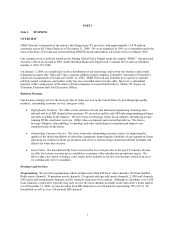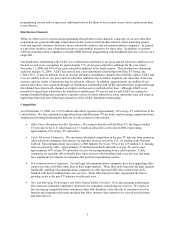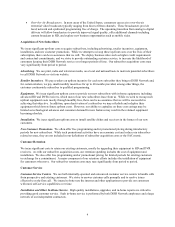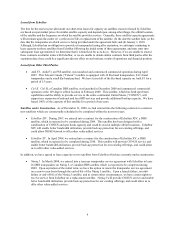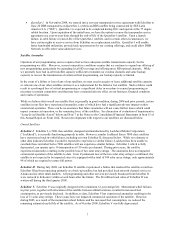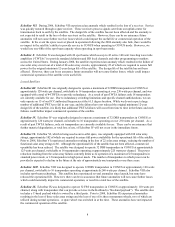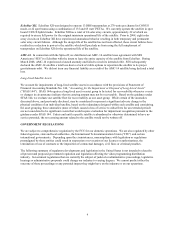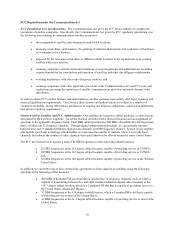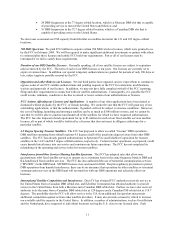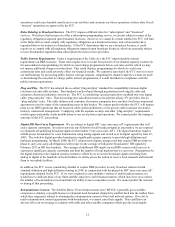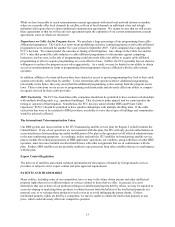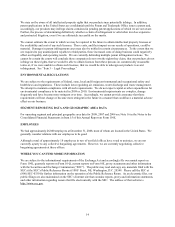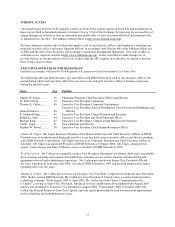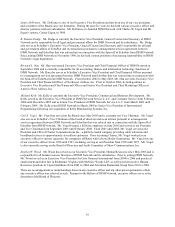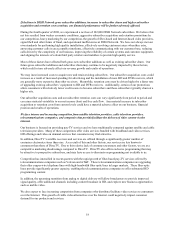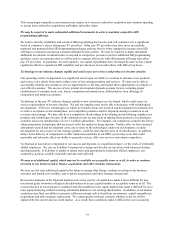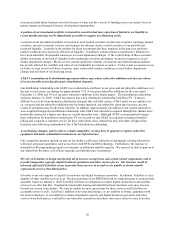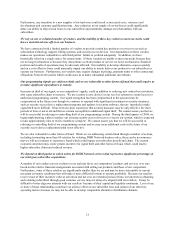Dish Network 2008 Annual Report Download - page 21
Download and view the complete annual report
Please find page 21 of the 2008 Dish Network annual report below. You can navigate through the pages in the report by either clicking on the pages listed below, or by using the keyword search tool below to find specific information within the annual report.
11
x 24 DBS frequencies at the 77 degree orbital location, which is a Mexican DBS slot that is capable
of providing service to most of the United States and Mexico; and
x 16 DBS frequencies at the 72.7 degree orbital location, which is a Canadian DBS slot that is
capable of providing service to the United States.
We also lease occasional-use FSS capacity from EchoStar on satellites located at the 121 and 105 degree orbital
locations.
700 MHz Spectrum. We paid $712 million to acquire certain 700 MHz wireless licenses, which were granted to us
by the FCC in February 2009. We will be required to make significant additional investments or partner with others
to commercialize these licenses and satisfy FCC build-out requirements. Part or all of our licenses may be
terminated if we fail to satisfy these requirements.
Duration of our DBS Satellite Licenses. Generally speaking, all of our satellite licenses are subject to expiration
unless renewed by the FCC. The term of each of our DBS licenses is ten years. Our licenses are currently set to
expire at various times. In addition, our special temporary authorizations are granted for periods of only 180 days or
less, subject again to possible renewal by the FCC.
Opposition and other Risks to our Licenses. Several third parties have opposed, and we expect them to continue to
oppose, some of our FCC satellite authorizations and pending requests to the FCC for extensions, modifications,
waivers and approvals of our licenses. In addition, we may not have fully complied with all of the FCC reporting,
filing and other requirements in connection with our satellite authorizations. Consequently, it is possible the FCC
could revoke, terminate, condition or decline to extend or renew certain of our authorizations or licenses.
FCC Actions Affecting our Licenses and Applications. A number of our other applications have been denied or
dismissed without prejudice by the FCC, or remain pending. We cannot be sure that the FCC will grant any of our
outstanding applications, or that the authorizations, if granted, will not be subject to onerous conditions. Moreover,
the cost of building, launching and insuring a satellite can be as much as $300 million or more, and we cannot be
sure that we will be able to construct and launch all of the satellites for which we have requested authorizations.
The FCC has also imposed a bond requirement for up to $3 million for each of our fixed satellite services satellite
licenses, all or part of which would be forfeited by a licensee that does not meet its diligence milestones for a
particular satellite.
4.5 Degree Spacing Tweener Satellites. The FCC has proposed to allow so-called “tweener” DBS operations –
DBS satellites operating from orbital locations 4.5 degrees (half of the usual nine degrees) away from other DBS
satellites. The FCC has already granted authorizations to Spectrum Five and EchoStar Corporation for tweener
satellites at the 114.5 and 86.5 degree orbital locations, respectively. Certain tweener operations, as proposed, could
cause harmful interference into our service and constrain our future operations. The FCC has not completed its
rulemaking on the operating and service rules for tweener satellites.
Interference from Other Services Sharing Satellite Spectrum. The FCC has adopted rules that allow non-
geostationary orbit fixed satellite services to operate on a co-primary basis in the same frequency band as DBS and
Ku-band-based fixed satellite services. The FCC has also authorized the use of terrestrial communication services
(“MVDDS”) in the DBS band. MVDDS licenses were auctioned in 2004. Despite regulatory provisions to protect
DBS operations from harmful interference, there can be no assurance that operations by other satellites or terrestrial
communication services in the DBS band will not interfere with our DBS operations and adversely affect our
business.
International Satellite Competition and Interference. DirecTV has obtained FCC authority to provide service to
the United States from a Canadian DBS orbital slot, and EchoStar Corporation has obtained authority to provide
service to the United States from both a Mexican and a Canadian DBS orbital slot. Further, we have also received
authority to do the same from a Canadian DBS orbital slot at 129 degrees and a Canadian FSS orbital slot at 118.7
degrees. The possibility that the FCC will allow service to the U.S. from additional foreign slots may permit
additional competition against us from other satellite providers. It may also provide a means by which to increase
our available satellite capacity in the United States. In addition, a number of administrations, such as Great Britain
and the Netherlands, have requested to add orbital locations serving the U.S. close to our licensed slots. Such


